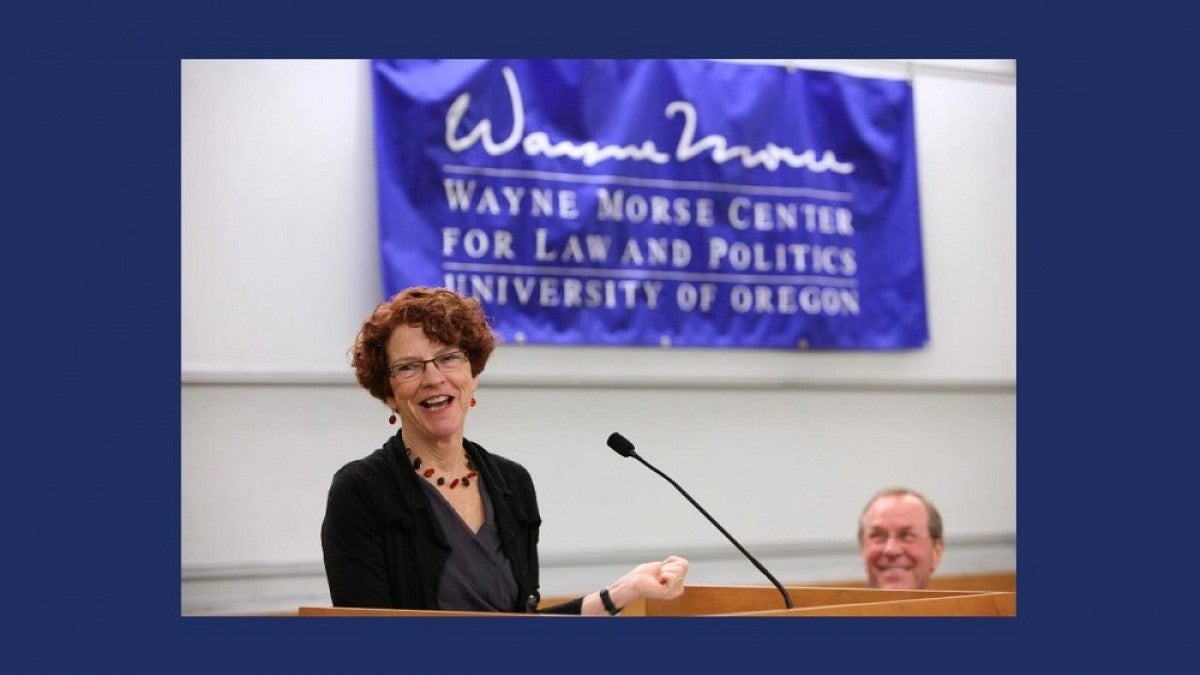For more than three decades, Margaret Hallock has served the UO and the broader community by looking at the world through the eyes of workers, women and the poor and imagining a better society.
During that time, she worked as an economics professor, UO Labor Education and Research Center director and, most recently, faculty codirector and founder of the Wayne Morse Center for Law and Politics. And though her work is not at an end, it will have a somewhat different focus following her retirement from the UO last month.
Throughout her career, Hallock was a dedicated women’s rights and labor rights activist. Her unstoppable pursuit of a fairer world for working men and women and the poor defined her working years.
“I love how deeply Margaret cares about the state of the economy and the lot of working people and how passionately she fights to make real change for the little guy and gal,” said Rebecca Flynn, Hallock’s co-director at the Morse center. “Margaret worked so hard for so many years on so many issues, doing everything from making copies to advising elected policymakers.”
Hallock began at the UO teaching economics as an assistant professor in 1974. Her passion for women’s rights and labor rights allowed her to enjoy teaching labor economics, women and the economy and other basic economics classes. Her commitment to advancing the concepts of progressive economics led her to work in state economic policy in 1979.
She wouldn’t be away from the UO for too long, however.
For several years, Hallock worked as the senior economist for the state forecasting office and the chief economist for the Service Employees International Union 503, allowing her the opportunity to lead the state pay equity effort to raise wages for female-dominated professions.
Nine years after leaving the UO, Hallock returned to the Eugene campus in 1988 as the director of the university’s Labor Education and Research Center. As director, she helped coordinate the Wayne Morse Chair of Law and Politics — an annual lecture that was the precursor to the eventual Wayne Morse Center for Law and Politics.
“At that time, the visitors to the Wayne Morse Chair were on campus for only a few days,” Hallock recalled. “I felt this was not enough for a public figure like Wayne Morse, who personified Oregon's independent and populist politics.”
In 1999, after years working with former UO President Dave Frohnmayer and Ed Conklin, one of Morse’s former colleagues, Hallock helped establish the center for law and politics on campus as a living memorial to the late senator.
For the past 17 years, the center has provided public programs centered on policy issues that Morse — and Hallock — championed in their respective careers, issues that have ranged from human rights to climate change to the criminal justice system.
“It has been a pleasure and privilege to bring the center to life,” Hallock said.
As a tribute to Hallock’s remarkable legacy, the center has announced the creation of the Margaret Hallock Program for Women’s Rights as a testament to her tireless work over her career to promote discussion of women’s issues. As part of the program, the center will ensure these issues are at the forefront of local, state and national policy discussions by engaging the community through annual films, art exhibits and guest lectures.
“I’m honored by the establishment of the Margaret Hallock Program for Women’s Rights,” she said. “Women will create the future world, but access to education, civil liberties and economic securities remain vital issues for women worldwide.”
“Margaret's legacy is the Wayne Morse Center itself,” Flynn said. “Through her tenacity, good judgment and administrative skills, Margaret grew what was simply an annual lecture into the thriving interdisciplinary center it is today.”
In her retirement, Hallock plans to travel and visit family in between her duties as the chair of the board of directors of Sponsors — a local nonprofit that helps people transitioning from prison to the community.
— By Nathaniel Brown, Public Affairs Communications


